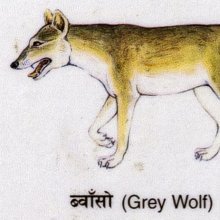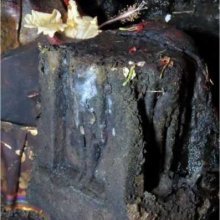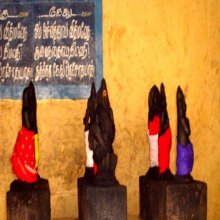Cani, Cānī, Caṉi, Cāṉi: 4 definitions
Introduction:
Cani means something in the history of ancient India, Marathi, Tamil. If you want to know the exact meaning, history, etymology or English translation of this term then check out the descriptions on this page. Add your comment or reference to a book if you want to contribute to this summary article.
Images (photo gallery)
India history and geography
Source: Institut Français de Pondichéry: The Shaivite legends of KanchipuramCaṉi (சனி) (in Tamil) refers to Śani in Sanskrit, and represents one of the proper nouns mentioned in the Kanchipuranam, which narrates the Shaivite Legends of Kanchipuram—an ancient and sacred district in Tamil Nadu (India). The Kanchipuranam (mentioning Caṉi) reminds us that Kanchipuram represents an important seat of Hinduism where Vaishnavism and Shaivism have co-existed since ancient times.

The history of India traces the identification of countries, villages, towns and other regions of India, as well as mythology, zoology, royal dynasties, rulers, tribes, local festivities and traditions and regional languages. Ancient India enjoyed religious freedom and encourages the path of Dharma, a concept common to Buddhism, Hinduism, and Jainism.
Languages of India and abroad
Marathi-English dictionary
Source: DDSA: The Molesworth Marathi and English Dictionarycānī (चानी).—f R W A squirrel.
Source: DDSA: The Aryabhusan school dictionary, Marathi-Englishcānī (चानी).—f A squirrel.
Marathi is an Indo-European language having over 70 million native speakers people in (predominantly) Maharashtra India. Marathi, like many other Indo-Aryan languages, evolved from early forms of Prakrit, which itself is a subset of Sanskrit, one of the most ancient languages of the world.
Kannada-English dictionary
Source: Alar: Kannada-English corpusCāṇi (ಚಾಣಿ):—[noun] (dial.) a stroke, struck with a stick on the palm.
Kannada is a Dravidian language (as opposed to the Indo-European language family) mainly spoken in the southwestern region of India.
See also (Relevant definitions)
Starts with (+20): Caniccuran, Caniccurunai, Canidruma, Canigama, Canigi, Canika, Canikai, Canikappuri, Canikatam, Canikka, Canikkacu, Canikkappuri, Canikkentai, Canikkilamai, Canilu, Canimulai, Canimulukku, Canimuttirai, Canin, Canina.
Ends with (+182): Abhishecani, Acani, Accani, Advaitaratnakoshatika tattvavivecani, Alattuccani, Ambusecani, Amitrashocani, Ancani, Anurecani, Arocakanacani, Arukacani, Arukecani, Asecani, Ashocani, Ashtamattuccani, Atacani, Atancani, Aticaranacani, Ayamcani, Bamdhavimocini.
Full-text (+153): Shani, Abhayasani, Kontaccani, Minaccani, Caniccurunai, Sanana, Canmaccani, Alattuccani, Canipotu, Caniyenney, Shvana, Canikkacu, Makattircani, Chani bor, Sanikama, Mutal-eluncani, Kappalunari, Elarai-antucani, Susanita, Kunninari.
Relevant text
Search found 20 books and stories containing Cani, Cānī, Cāṇi, Caṉi, Cāṉi, Chani, Sani; (plurals include: Canis, Cānīs, Cāṇis, Caṉis, Cāṉis, Chanis, Sanis). You can also click to the full overview containing English textual excerpts. Below are direct links for the most relevant articles:
The Ways of a Maid < [March 1944]
Musical Compositions of Muthuswami Dikshitar on Planets < [April – June, 1982]
The Hindus and the Skies < [September 1943]
Jainism in Odisha (Orissa) (by Ashis Ranjan Sahoo)
Jaina Antiquities at Sunderpada (Khordha) < [Chapter 3: Survey of Jaina Antiquities in Odisha]
Rig Veda (translation and commentary) (by H. H. Wilson)
The history of Andhra country (1000 AD - 1500 AD) (by Yashoda Devi)
Part 20 - Beta I (A.D. 1103-1110) < [Chapter II - The Haihayas]
Later Chola Temples (by S. R. Balasubrahmanyam)
Temples in Omampuliyur < [Part II - Contributions of the Later Pallavas to the Chola-Pallava Phase]
Temples in Madhurantakam (Kadapperi) < [Chapter II - Temples of Kulottunga I’s Time]
Temples in Suryanarkoyil < [Chapter II - Temples of Kulottunga I’s Time]
Related products





